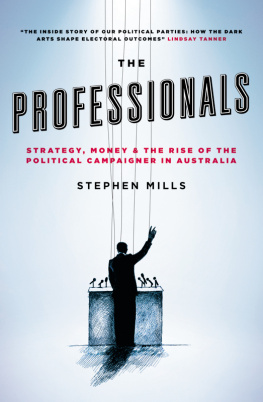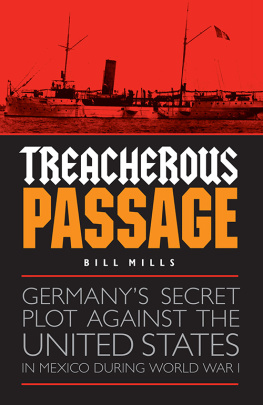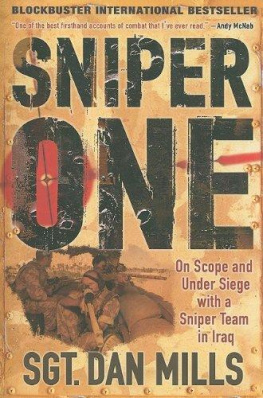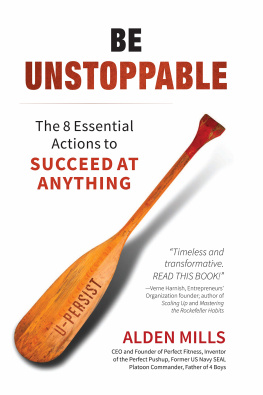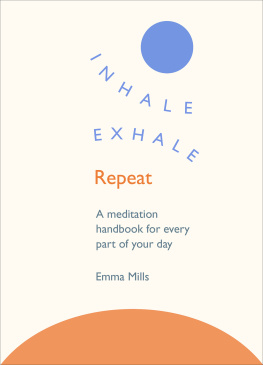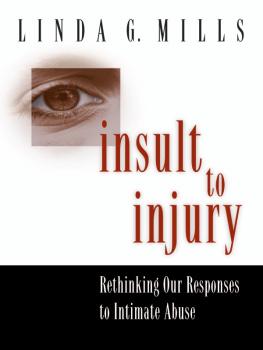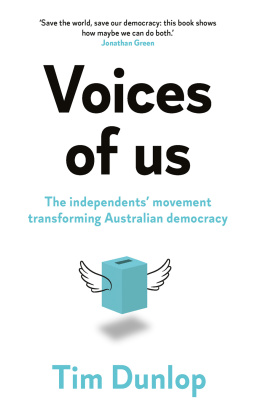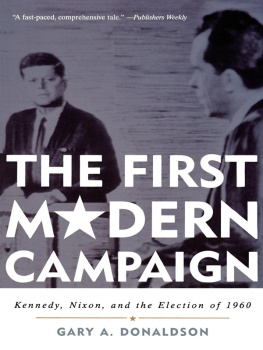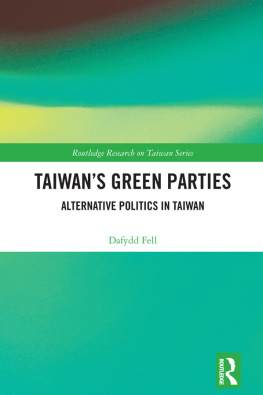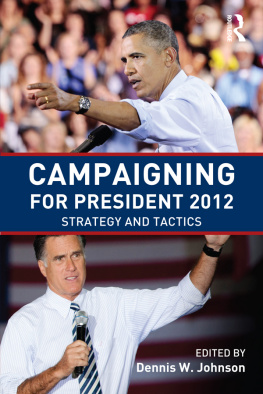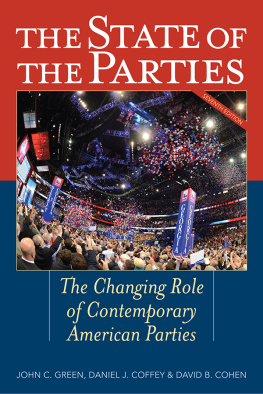Published by Black Inc.,
an imprint of Schwartz Publishing Pty Ltd
3739 Langridge Street
Collingwood VIC 3066 Australia
email: enquiries@blackincbooks.com
www.blackincbooks.com
Copyright Stephen Mills 2014.
Stephen Mills asserts his right to be known as the author of this work.
ALL RIGHTS RESERVED.
No part of this publication may be reproduced, stored in a retrieval system, or transmitted in any form by any means electronic, mechanical, photocopying, recording or otherwise without the prior consent of the publishers.
The National Library of Australia Cataloguing-in-Publication entry:
Mills, Stephen, 1954- author.
The professionals : strategy, money and the rise of the political campaigner / Stephen Mills.
9781863956710 (paperback)
9781922231727 (ebook)
Campaign management--Australia--History. Political campaigns--Australia--History. Communication in politics--Australia. Marketing--Political aspects. Public relations and politics--Australia. Elections--Australia--History. Australia--Politics and government.
324.70994
CONTENTS
For Helen, Janet, Chris
and of course Shane
FEDERAL/NATIONAL SECRETARIES OF THE AUSTRALIAN LABOR PARTY
LIFE DATES | TERM IN OFFICE | ELECTIONS AS NATIONAL CAMPAIGN DIRECTOR |
ARCH STEWART | 18671925 | 191525 |
DANIEL McNAMARA | 18761947 | 192546 |
PATRICK KENNELLY | 19001981 | 194654 |
JACK SCHMELLA | 19081960 | 195460 |
F. E. CHAMBERLAIN | 19001984 | 196163 |
CYRIL WYNDHAM | 19302012 | 196369 |
MICK YOUNG | 19361996 | 196972 | 1972 |
DAVID COMBE | 1943 | 197381 | 1974, 1975, 1977, 1980 |
BOB McMULLAN | 1947 | 198188 | 1983, 1984, 1987 |
BOB HOGG | 1937 | 198893 | 1990, 1993 |
GARY GRAY | 1958 | 19932000 | 1996, 1998 |
GEOFF WALSH | 1953 | 200003 | 2001 |
TIM GARTRELL | 1971 | 200308 | 2004, 2007 |
KARL BITAR | 1971 | 200811 | 2010 |
GEORGE WRIGHT | 1968 | 2011 | 2013 |
FEDERAL DIRECTORS OF THE LIBERAL PARTY
LIFE DATES | TERM IN OFFICE | ELECTIONS AS NATIONAL CAMPAIGN DIRECTOR |
DON CLELAND | 19011975 | 194551 |
ROBERT WILLOUGHBY | 19081993 | 195169 |
BEDE HARTCHER | 19181977 | 196974 |
TIM PASCOE | 1939 | 1974 |
TONY EGGLETON | 1932 | 197491 | 1975, 1977, 1980, 1983, 1984, 1987, 1990 |
ANDREW ROBB | 1951 | 199197 | 1993, 1996 |
LYNTON CROSBY | 1956 | 19972003 | 1998, 2001 |
BRIAN LOUGHNANE | 1957 | 2003 | 2004, 2007, 2010, 2013 |
INTRODUCTION
Election night, September 2013: Before a whooping crowd in the ballroom of Sydneys Four Seasons Hotel, the prime minister-elect claimed victory for the Coalition parties. Thanking those who had contributed to the victory, Tony Abbott singled out for special praise the Liberal Partys federal director, Brian Loughnane, who, he said, had run our most professional campaign ever. The moment passed with more cheers but it raised important questions about contemporary Australian politics. What is a professional campaign? What does it mean to run such a campaign? The Liberal Party, of which Abbott was the parliamentary leader and Loughnane the organisational head, had been in existence for nearly seventy years and had won seventeen national elections, along with plenty more in the states and territories. So was 2013 actually their most professional campaign? To answer these questions, we need some way of defining party professionalism and measuring it across different election campaigns and, for that matter, across different political parties; was the Liberals 2013 campaign more professional than that of the Labor Party, which was defeated after six turbulent years in office? And that leads to even bigger questions. Does professionalism actually work that is, can it translate into electoral success and if so, how? If it does work, by somehow influencing the behaviour of voters, then the next question must be whether that is a good thing: if election campaigns are crucial events in our democratic life, are we happy that they are being run in a professional way? Do professional campaigns aim to provide what is best for the electorate, or simply what is most effective and efficient for their parties? Is a professional campaign something to be celebrated?
The prime ministers compliment for the party official may have left the television audience scratching their heads over a simpler question: Brian Who? Party officials such as Brian Loughnane, or his Labor Party counterpart, national secretary George Wright, are far from household names. They stay out of sight, or at least off-camera, working in head offices and campaign headquarters that are closed to the media and to voters. Their work remains secret and invisible: formulating a campaign strategy, assembling a campaign team and raising the funds to deliver victory. Part of their identity as political professionals is a reticence, a protective silence about the party and its affairs. Loose lips sink ships. They might be glimpsed during an election campaign: shadowy backroom figures, briefing the candidate on their latest focus groups, or boasting about their campaign preparedness, or negotiating the rules for a leaders debate. Their names can be heard spoken rapidly at the end of TV advertisements, which by law must be authorised by them. On election night in 2013, it was Brian Loughnane who had interpreted the results and at around 8.45 pm privately told Tony Abbott he would win; he got a bear hug in exchange. After all the votes are counted, and whether their party has won or lost, the party officials make rare outings to the National Press Club, to spin the result as best they can. In this zero-sum contest, everything they say and do is directed at advancing their partys interests relative to their opponent.
As a consequence of this secrecy and spin, Australians have lacked a convincing account of who these party officials are, what they do, and how they have come to change the conduct of Australian politics. In turn, we have not been able to address the broader questions about professionalism. This book attempts to fill those gaps. It seeks first to assemble those episodic glimpses of party officials into a continuous narrative to put flesh on these shadowy figures, to peer underneath their mask of professional reticence and thus to recognise them not as incidental spear-carriers but as influential political actors in their own right. By retrieving the lost lineage of these party officials it is possible to provide a new perspective on Australian election campaigns and to create an alternative narrative of Australian political history. Instead of thinking about politics solely in terms of what happens in Parliament House the rise and fall of prime ministers and opposition leaders, the clash of interests in Cabinet, the theatre of Question Time, the scope and impact of ministerial decision making this narrative shifts the focus to the parties head offices. It shifts our attention from the public activities of candidates and voters to the more secretive operations of party officials.

